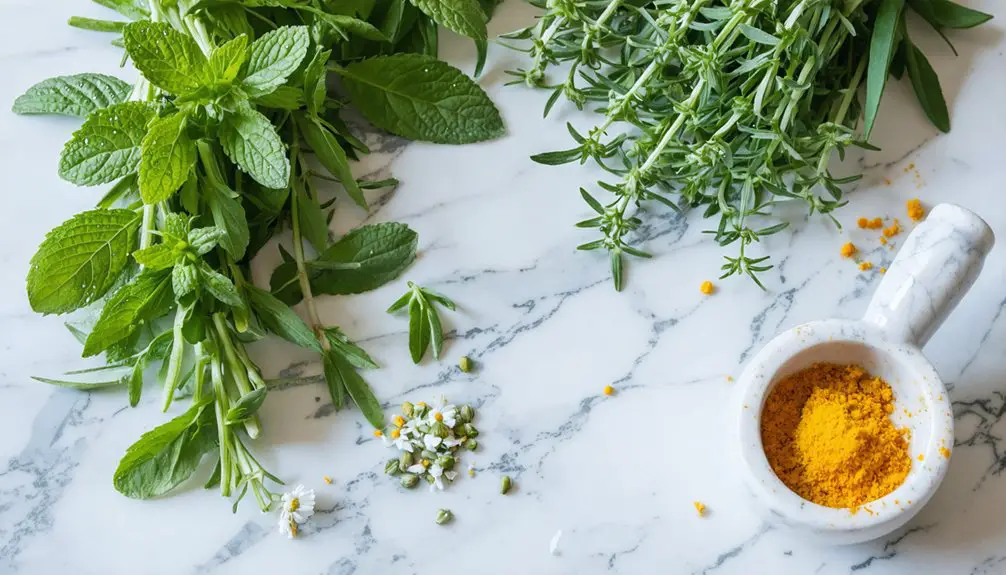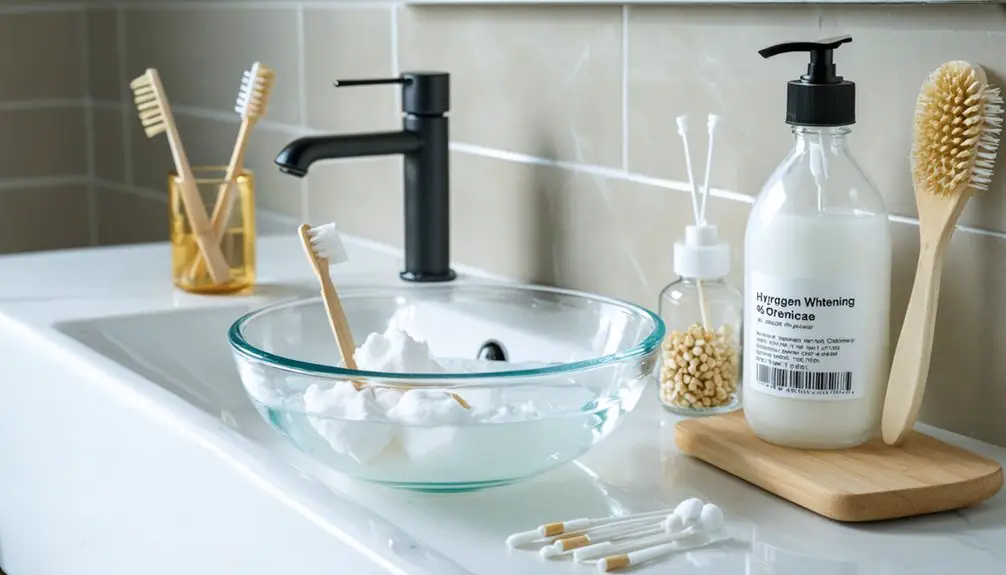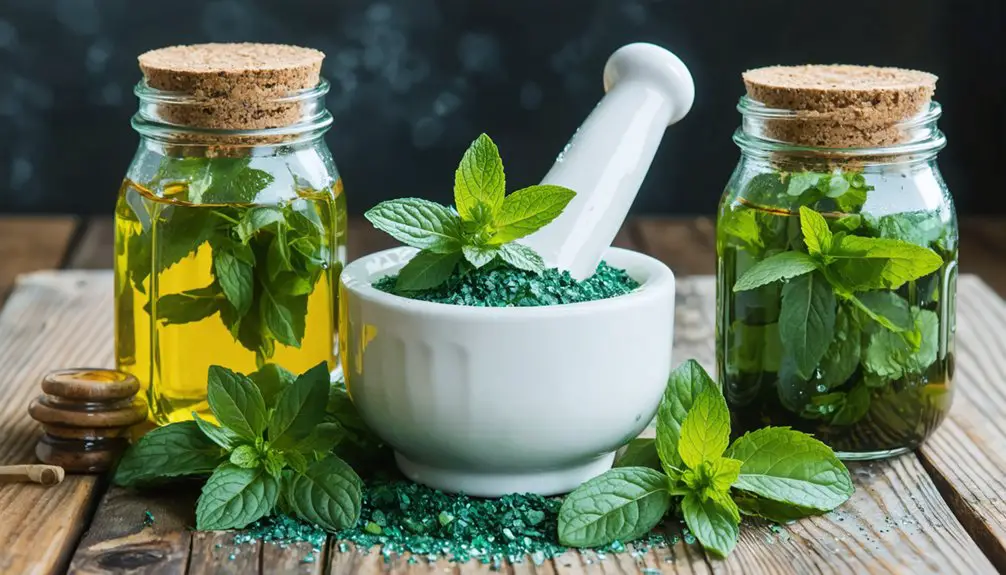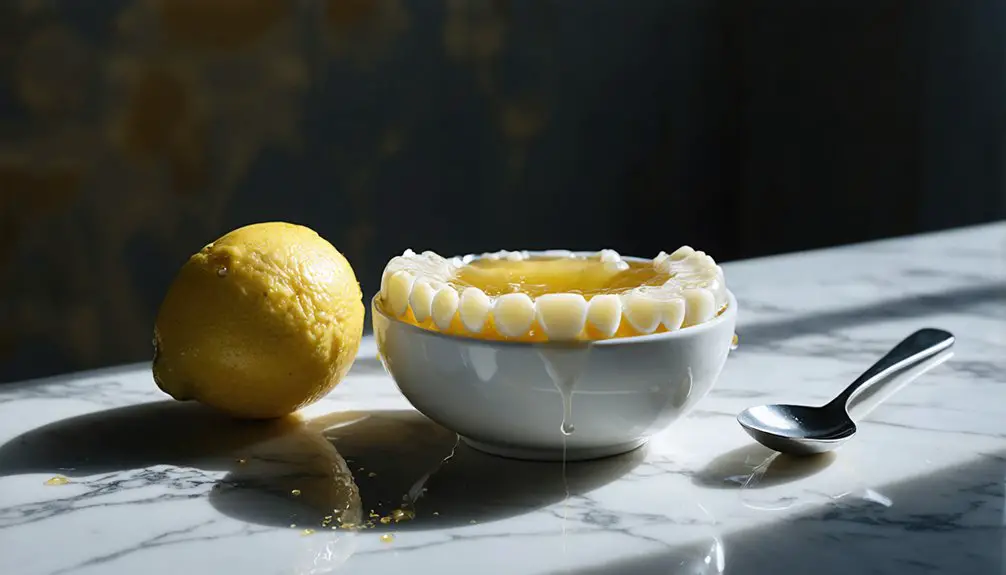You can brighten your smile naturally with these proven herbal solutions. Try pineapple extract for its powerful whitening properties, or massage banana peel directly onto teeth to reduce discoloration. Incorporate coconut oil pulling into your morning routine, while herbs like neem and holy basil provide gentle brightening effects. Essential oils such as peppermint and clove offer antibacterial benefits alongside whitening. Discover how these natural alternatives can transform your oral care routine while protecting your overall wellness.
Key Takeaways
- Pineapple extract naturally whitens teeth through its pH-balancing properties while being gentle on tooth enamel.
- Coconut oil pulling for 15-20 minutes daily helps remove stains and impurities while promoting overall oral health.
- Natural tooth powders containing neem, activated charcoal, and bentonite clay provide effective, enamel-safe whitening benefits.
- Turmeric paste offers gentle teeth whitening properties while delivering anti-inflammatory and antibacterial benefits.
- Banana peel rubbing is scientifically proven to reduce tooth discoloration without harsh chemicals or abrasives.
Understanding Nature’s Tooth-Brightening Herbs
The world of natural tooth whitening offers an array of powerful herbal solutions that can brighten your smile without harsh chemicals. You’ll find remarkable pineapple extract benefits, which provide significant whitening effects thanks to its natural pH properties that gently work on your enamel surface.
Nature’s gentle wisdom reveals itself through herbal tooth whitening solutions, where pineapple extract leads the way to a brighter, healthier smile.
While not as potent, banana peel efficacy has also been scientifically proven to reduce tooth discoloration safely. Coconut oil pulling enhances whitening by drawing out impurities through its gentle cleansing action.
For those seeking to share nature’s gifts with others, herbal alternatives like neem, holy basil, and turmeric offer gentle yet effective options. These plant-based ingredients work harmoniously with your body’s natural processes, unlike chemical whiteners that may cause sensitivity.
You’re making a mindful choice by embracing these natural solutions, which protect both your smile and overall wellness while achieving noticeable brightening results.
Essential Oils for Daily Oral Care
When exploring natural oral care solutions, essential oils emerge as powerful allies in maintaining a healthy, vibrant smile. You’ll find remarkable essential oil benefits in popular options like peppermint, clove, cinnamon, eucalyptus, and tea tree oils. Their natural antibacterial properties help combat harmful bacteria while supporting gum health and fresh breath. These natural compounds have been used for centuries in traditional oral care practices.
You can easily incorporate these healing oils into your daily routine by adding a few drops to water for an antimicrobial mouth rinse, or blend them with carrier oils for gentle gum massage. A cooling sensation from peppermint helps freshen breath immediately.
These plant-based alternatives offer powerful protection against cavities, plaque, and gingivitis while providing soothing anti-inflammatory and analgesic effects.
Whether you’re making your own oral care blends or choosing essential oil-infused products, you’re embracing nature’s wisdom for peak dental health.
Traditional Herbal Rinses and Their Benefits
Deeply rooted in ancient healing traditions, herbal mouth rinses offer a gentle yet potent approach to maintaining ideal oral health. Traditional rinses efficacy stems from powerful herbs like clove, neem, and tulsi, which naturally combat harmful bacteria while soothing irritated gums. The growing consumer demand for natural oral care products reflects a broader shift toward sustainable wellness solutions. Essential oils like tea tree and eucalyptus provide natural antibacterial protection against harmful microbes.
Ancient wisdom meets modern wellness through herbal mouth rinses, harnessing nature’s power to protect and heal our oral health naturally.
You’ll find these plant-based formulas particularly beneficial if you’re seeking alternatives to conventional mouthwashes, as they’re free from harsh chemicals and artificial ingredients.
- Herbal mouthwash benefits include natural antibacterial and anti-inflammatory properties from ingredients like calendula and echinacea.
- Clinical studies support traditional rinses in fighting plaque and gingivitis, often matching synthetic options but with fewer side effects.
- Safe for sensitive mouths and special populations, including pregnant women and those with dry mouth conditions.
These time-tested remedies combine nature’s wisdom with modern dental care, offering you a holistic path to oral wellness.
Herbal Powders for Natural Teeth Polishing
Moving beyond liquid rinses, natural tooth powders offer a powerful way to polish and brighten your smile. Traditional ingredients like neem, babul, and clove work together with gentle natural abrasives to remove surface stains while protecting your enamel. These herbal formulations draw from ancient healing traditions that span over 5,000 years of documented use.
You’ll find these herbal combinations particularly effective when they include rock salt or calcium carbonate for gentle exfoliation. The twice daily use provides optimal cleaning and protection for your teeth.
What makes these powders special is their ability to support complete oral wellness. While activated charcoal and bentonite clay naturally whiten your teeth, anti-inflammatory herbs like sage and nutmeg help strengthen your gums.
You’re not just polishing – you’re nurturing your entire oral ecosystem without harsh chemicals. The alkaline properties of ingredients like baking soda help maintain ideal pH balance, creating an environment where your smile can truly thrive.
Safe Application Methods and Best Practices
Although herbal teeth whitening offers natural benefits, proper application techniques guarantee both safety and effectiveness. When preparing your herbal paste, combine ingredients mindfully – mix baking soda with hydrogen peroxide gently, or mash fresh strawberries thoroughly. The mixture creates an alkaline environment that naturally fights bacteria while whitening. Eating crunchy produce helps scrub away plaque during chewing.
You’ll want to apply these natural solutions with care, using soft brushes or your finger to protect your gums while maximizing whitening potential.
- Oil pull with coconut oil for 15-20 minutes daily, swishing gently between teeth to draw out impurities
- Apply baking soda mixtures no more than twice weekly, brushing softly for 2 minutes
- Rinse thoroughly after using any herbal whitening agent to maintain oral pH balance
Remember to store your natural ingredients properly and always prepare fresh mixtures for ideal results.
Frequently Asked Questions
Can Pregnant Women Safely Use Herbal Teeth Whitening Solutions?
You’ll want to avoid even herbal teeth whitening solutions during pregnancy since their safety hasn’t been proven. Instead, focus on gentle brushing and natural stain prevention through your daily oral care routine.
How Long Should I Wait After Eating Before Using Herbal Teeth Treatments?
You’ll want to wait at least 30 minutes after eating to maximize your herbal treatment effectiveness. This timing consideration allows your saliva to neutralize acids and your teeth to better absorb natural ingredients.
Will Herbal Whitening Methods Remove Deep Intrinsic Stains From Medications?
Beauty isn’t just skin deep, and neither are medication stains. You won’t effectively remove intrinsic stains with herbal ingredients alone. These natural remedies only work on surface stains, not deep discoloration.
Can Children Use Natural Herbal Teeth Whitening Products?
You shouldn’t use herbal whitening products on children’s teeth due to safety concerns. Their developing teeth are sensitive, and even natural treatments need pediatric dental supervision for proper child dental care.
Do Herbal Whitening Solutions Interact With Dental Crowns or Veneers?
While herbal ingredients won’t damage your dental materials, they won’t whiten crowns or veneers. You’ll only see whitening effects on your natural teeth, which could create color mismatches with existing restorations.
References
- https://pmc.ncbi.nlm.nih.gov/articles/PMC10024105/
- https://hiawasseefamilydental.com/blog/2023/05/30/5-foods-to-naturally-brighten-your-smile/
- https://www.advancedsmilesmarion.com/resources/best-natural-way-to-whiten-teeth
- https://www.luriedental.com/dental-services/cosmetic/blog/do-natural-teeth-whitening-remedies-really-work
- https://www.dentistryformidtown.com/blog/natural-teeth-whitening-remedies-separating-fact-from-fiction/
- https://jurnal.unprimdn.ac.id/index.php/bulkesprima/article/download/6793/3859/26605
- https://globalresearchonline.net/ijpsrr/v79-2/16.pdf
- https://pmc.ncbi.nlm.nih.gov/articles/PMC9645194/
- https://www.mymagnoliafamilydental.com/top-ten-natural-herbs-for-teeth-whitening/
- https://risewell.com/blogs/news/the-benefits-of-essential-oils-in-oral-care



